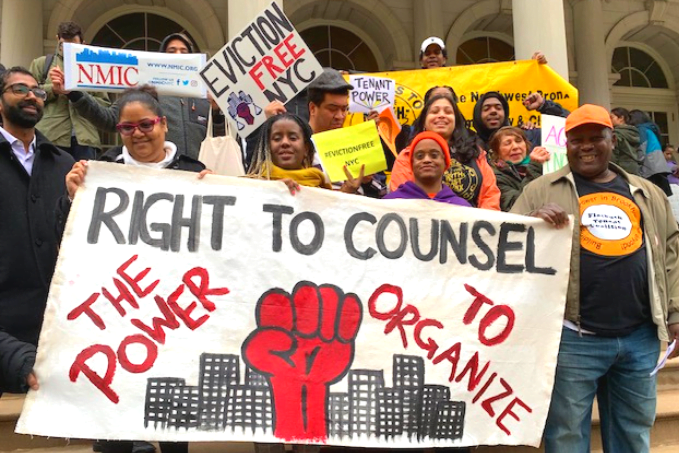The program was tested from 2005 to 2008 in South Bronx and provided more than 1300 families with legal assistance and prevented eviction in 86 percent of cases. It cost around 450,000 but saved New York City more than 700,000 in estimated shelter costs alone. (Seedco, Housing Help Program, South Bronx)
In August 2017, the New York City passed the Universal Access law, that gives free legal assistance to low income tenants facing eviction process. The law is valid for 5 years (by 2022) and tenants who are over income, have at least the right to a consultation with an attorney.
The city’s FY 2018 budget included $15M for the first phase of the program, which is reaching 20 of the city’s 200+ zip codes.
The New York City is the first city in the United States that implemented a universal right to counsel for low income tenants facing evictions.
The right to counsel (RTC) in civil matters has been also established in France, Sweden, Azerbaijan, India, Zambia, and many other countries.
Impact
During the first year of the right to counsel (2018), up to 87,000 residents of the city faced evictions took advantage of free legal advice.
In the last quarter of 2018, approximately 56 percent of tenants facing an eviction in RTC zip codes had an attorney.
Evictions declined more than five times faster in RTC zip codes than in non-RTC zip codes (RTC zip codes: -11%, non-RTC zip codes: -2%).
There were approximately 18,000 marshal’s evictions in 2018, a 37% decline compared to 2013. It means that approximately 100,000 New Yorkers could remain in their homes and weren’t evicted.
In November 2019, the Wall Street Journal found out that number of eviction fillings dropped by 46 percent compared to the same period last year.
Eviction filings for non-payment of rent made up the majority (82.1%) of filings in 2019, though this type of filing experienced a slight decrease in share from 2018 (83.4%).

Landlords started 535 fewer renovation projects from July through November in rent-regulated buildings over the same period in 2018 (decline of 44%)
Total renovation spending dropped by $71 million. The owners argue that the law will cause insufficient repair of apartments.
Emergency and non-emergency 311 calls involving tenant issues fell 20 percent between July and November 2019 compared to the same period last year.
Evictions dropped by nearly 20% in 2019 in neighborhoods where low-income tenants received free, city-funded legal services, a new analysis found.
The city reports nearly 84% of tenants who got free lawyers under the law managed to stave off eviction.
There is considerable variation in filing rates across cities. Washington, D.C. consistently had the highest filing rate of the four cities at twice the rate in New York City and three times the filing rate in Philadelphia.
New York City had the second highest rate with a rate twice as high as in Chicago. Undoubtedly, differences in population composition, economic conditions, eviction processes, data collection, and policy responses across cities each contributes to the large variation in filing rates.




